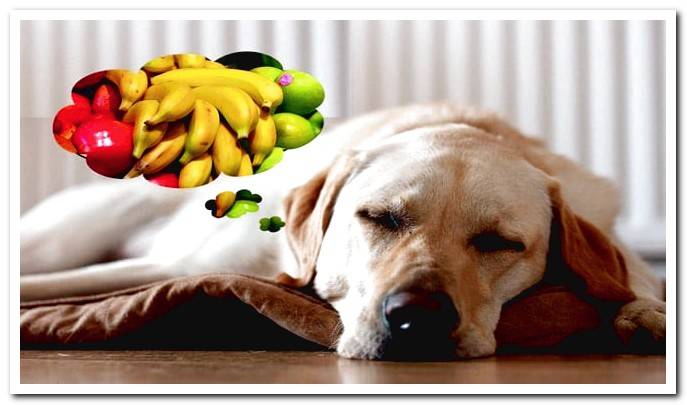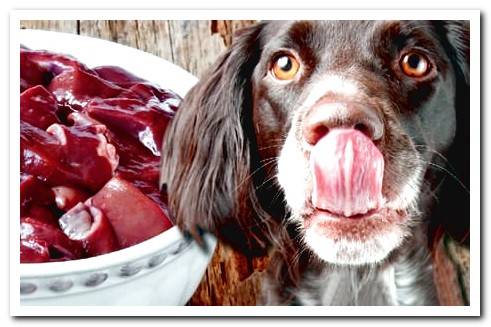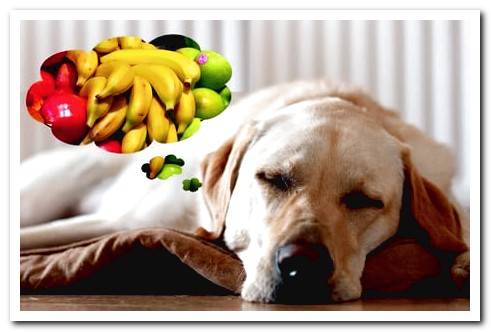
All dogs need a balanced and nutritious diet that includes all the vitamins and minerals necessary for proper development. Vitamins not only influence the mood of the dog but also play a role in the development and maintenance of bones and organs.
Many people wonder what are the best vitamins for adult dogs or dogs with certain health problems, ultimately buying complete vitamin supplements without really knowing what they are giving their dogs.
We are going to explain what are the best vitamins that we can give our puppy and how to administer them naturally. Since as we all know, the vitamins in pills are not of good quality and often are not even assimilable by the dog.
Index of contents
- 1 Types of vitamins for dogs
- 2 What are the best vitamins for a dog?
- 3 How to give vitamins to a dog
- 3.1 Chicken’s liver
- 3.2 Sardines
- 3.3 cheese
- 3.4 Assorted fruits
- 3.5 Assorted vegetables
- 3.6 Sun
- 4 Conclusions
Types of vitamins for dogs
These are the most requested names of vitamins for dogs due to the important function they fulfill, strengthening the health of the dog or helping its correct development.
Depending on whether we want vitamins for hunting dogs or vitamins for malnourished dogs, we must focus on one specific group of vitamins or another, or all at once if it is a sick or elderly dog.
- Vitamin A: This vitamin is very important for the general development of the dog, having a fundamental role in growth and in the dog’s skin and hair. It is also attributed an important role in the development of the sense of sight.
- Vitamin B: It is not a vitamin in itself but the name of a complex group of vitamins that play fundamental roles in the body of the whole dog (B1, B2, B3, B5, B6, B9 and B12). Fundamental for the strength of the dog, the proper functioning of its immune system, for the maintenance of its fur and hair, for the correct absorption of nutrients in the digestive system and for a number of vital functions.
- Vitamin C: Essential for the dog’s immune system and for proper bone calcification, dogs need this vitamin to develop and maintain strong bones.
- Vitamin D: Also essential for the correct development of the dog’s skeleton, it is essential for calcium to fulfill its function in the bones. It also plays an important role in the assimilation of nutrients.
- Vitamin E: In addition to being a highly recommended natural antioxidant in older dogs, it also plays an important role in the formation of organic tissues in the dog, that is, in its development and maintenance.
- Vitamin K: It is very important for the circulatory system of the dog, in addition to being a great ally of the immune system against harmful external factors.
What are the best vitamins for a dog?
There are no better or worse vitamins for a dog, you simply need to know what type of vitamin your dog needs and why. Administering a vitamin complex to a dog just doesn’t make any sense In addition, an excess of certain vitamins can be very harmful to your health.
Elderly dogs with a balanced diet do not need complete vitamin complexes, however our vet may recommend that we give them a vitamin E supplement due to its antioxidant properties.
Sick dogs do need a vitamin supplement even if they have a balanced diet, for example dogs with leishmaniasis they usually suffer from generalized anemia, so a complete supplement is the most indicated.
Hunting dogs that require intense efforts at certain times of the year, are usually treated with vitamins A, D, E and K so that they are strong and healthy, prepared for the season. As with competition dogs, which require extra energy on certain dates.

How to give vitamins to a dog
Although we all know a large number of companies that sell vitamin complexes in pills or liquids, the truth is that these types of vitamins are not the most recommended. Vitamins must be natural, obtained from organic means so that they are assimilable and effective, that is why we recommend administering vitamins naturally.
Let’s go over what they are the best foods rich in certain groups of vitamins, so that we can give them to our dogs in an adequate amount (it should never be abused, as lack is as bad as excess). Remembering that the best way to obtain healthy vitamins is through fruit.
Chicken’s liver
Chicken liver contains a large number of essential vitamins for a dog, such as vitamin C, a large number of the B vitamins group. and a lot of vitamin A.
Chicken liver also contains important minerals for the dog, such as zinc, copper, iron, and even calcium. However, an excess of liver can result in diarrhea, so we must be cautious and give liver in small amounts along with their usual food.
We can also use liver from other animals such as lamb or cow, being always recommended to cook them in water for two or three minutes to avoid possible parasites.
Sardines
Sardines are a food with impressive properties, they contain a large amount of B vitamins, mainly B12 and B6. They also provide an impressive amount of iron and protein, something that will give a lot of extra energy to our dog.
And not only that, but they also contain a large number of beneficial fatty oils such as Omega 3 and Omega 6, which will help lower the dog’s cholesterol and improve its skin and coat.
It is recommended to use canned sardines, in olive or sunflower oil, remove the oil and chop the sardines to administer them together with their natural diet. A dog over thirty kilos in weight can take a can once a week as an example.
cheese
Cheese is an important source of calcium for our dogs and an excellent source of protein and fat for their nutrition. It also provides an important amount of vitamin A, important for the general development of the dog.
The cheese does not contain lactose so it is not harmful to dogs However, some dogs do not fully tolerate it, so although this only happens in very few cases … it is advisable to always start with small portions to evaluate how it feels.
It does not matter if we use cow’s milk or sheep’s cheese, although it is true that it is more recommended that it be sheep’s cheese. We should not give it the rind or outer part of the cheese since it can contain bacteria (in the same way that we do not eat it either).
- Cheese suitable for dogs< /li>

Assorted fruits
The fruit provides a great variety and quantity of vitamins to dogs, although we must be aware that dogs should not eat the seeds of the fruit. Apple, pear or peach among many other fruits are really healthy for a dog.
As with any other food, in quantity is the trick. If we give a lot of fruit to a dog we may cause a diarrheaTherefore, it is recommended to start with small portions and evaluate.
Some dogs eat apple without problems but others may not feel well at all and it is better to give pear, as an example. Everything is testing and evaluating, we must use our common sense.
Assorted vegetables
Vegetables are a great source of vitamin K, Swiss chard, cabbage or spinach for example contain large amounts of vitamin K for a dog. However, these types of vegetables are not very digestible by the digestive system of dogs, so it is advisable to cook them previously.
We should not provide large quantities of cooked vegetables to our dog because they greatly loosen the intestine, that is, they cause diarrhea. A small amount from time to time is more than enough.
Sun
Yes, we already know … the sun is not a food. But nevertheless the sun it’s an amazing source of vitamin D. Dogs cannot absorb vitamin D through their fur the way humans do. However…. your hair retains this vitamin.
Have you never seen your dog lick its paws after sunbathing? It is her instinctive way to absorb the vitamin D that the sun has left on her hair, it may seem incredible but it is completely real.
Conclusions
Do not self-medicate your dog by buying vitamin supplements for no reason or simply because you look a little down. It should always be a vet who recommends the use of vitamins.
An excess of vitamins can be so harmful to your health how a lack of them Dogs need a limited amount of vitamins for strong health.
If you choose to give natural vitamins through the mentioned foods, always remember that balance is in quantity. Never abuse these foods or consider them as the only source of food.
